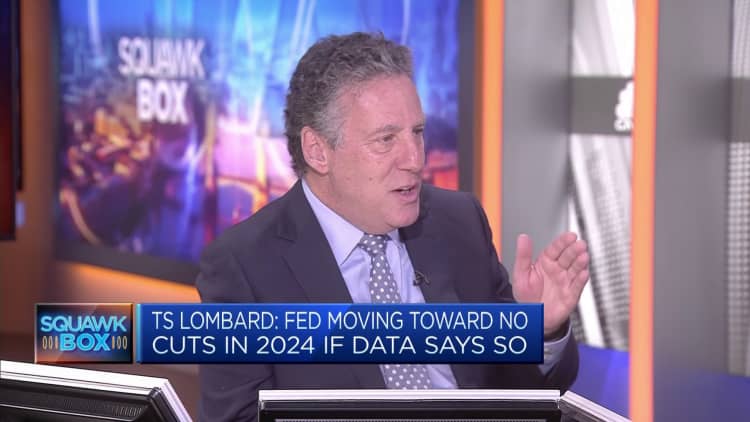Federal Reserve Bank Chair Jerome Powell speaks during a news conference at the bank’s William McChesney Martin building on March 20, 2024 in Washington, DC.
Chip Somodevilla | Getty Images News | Getty Images
Markets will continue to rally even if the Federal Reserve chooses not to cut interest rates this year, according to Steven Blitz, chief U.S. economist at TS Lombard.
His comments come as investors await the release of further U.S. economic data and closely monitor clues from Fed officials about the expected number of interest rate cuts in 2024.
Last week, the U.S. central bank left interest rates unchanged for the fifth consecutive time, in line with expectations, keeping its benchmark overnight borrowing rate in a range between 5.25%-5.5%. The Fed also said at the time that it still expects three quarter-percentage point cuts by the end of the year.
The message fueled a market rally in the U.S. and overseas, with benchmark indexes climbing to fresh record highs since.
Asked on Thursday about the likelihood of one or no Fed interest rate cuts this year, Blitz said that it’s “getting pretty good. You know that 0.4% month over month is a high number, and you know they are looking at that. They’re not just looking at year over year.”
“Really what is going on here is an evolution, right?” Blitz told CNBC’s “Squawk Box Europe” on Thursday.
“They [the Fed] have already told you they are not going to hike rates to try to shorten that timeline of getting to 2%, so if you’re the market you’re like, ‘well that’s OK,'” Blitz said.
“The key is … let the markets figure that out, rather than the Fed imposing that view. Let everybody evolve to that position slowly, and then all’s OK.”
Traders are currently pricing in a roughly 55% chance of a first Fed rate cut in June, according to the CME FedWatch Tool. That’s down from nearly 70% last week.
Blitz said markets will likely continue to march higher, even if the Fed decides not to impose any interest rate cuts this year — a prospect that U.S. asset manager Vanguard named as their base-case scenario.
“It’s a very big, diverse economy and it’s a very big country. So, you never have all geographic regions and every industry in every corner of the country doing well. There are always leaders [and] laggards, it’s just the nature of the beast, right?” Blitz said.
“The equity investor’s job is to pick out what’s doing better, you know, where the value is but as an economist stepping back, you say no there is no reason for the…
Click Here to Read the Full Original Article at Top News and Analysis (pro)…


